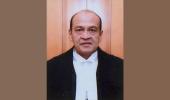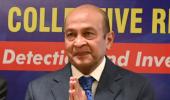Seventeen years after the cash-at-judge's door case rocked the judiciary, a special Central Bureau of Investigation court in Chandigarh on Saturday acquitted former Punjab and Haryana high court judge Nirmal Yadav and four others in the matter.

In the sensational case, a packet containing Rs 15 lakh was allegedly wrongly delivered at the residence of Justice Nirmaljit Kaur, another sitting high court judge, on August 13, 2008.
It was alleged that the cash was meant for Justice (Retd) Nirmal Yadav as a bribe to influence a property deal.
The matter was reported to the Chandigarh Police, following which an FIR was registered in the matter.
However, the case was later transferred to the CBI.
Reacting to her acquittal, Yadav said she did not do anything wrong and has 'full faith in the judicial system'.
Defence counsel Vishal Garg Narwana said the Court of Special CBI judge Alka Malik acquitted Yadav and four others on Saturday.
There were a total five accused in the case, one of whom died during the trial.
"Today the court has passed the judgment in the matter. Justice (Retd) Nirmal Yadav has been acquitted. False allegations had been levelled against her," Narwana told reporters in Chandigarh.
A detailed order is awaited.
"I had been given an exemption by the court from appearing but still I used to enquire about the hearing. It is a very long process... I had quite high hopes in life even before retirement. My ambition was to go to the highest court. I wanted to do a lot of things, but because of this I could not... I don't have any regrets, I have used this time to work positively," Yadav told PTI Videos.
"Yes, I have suffered but it was fate. I have faith in the judicial system and it has done justice," she said.
Advocate B S Riar, counsel for accused Rajiv Gupta and Sanjeev Bansal, said, "Yes, it took 17 years for this judgment, but that was not the fault of the defence counsel. The delay was on the part of the CBI as they kept seeking permissions from the high court and bringing in different witnesses at different times."
"The important thing is that justice has finally been served. We are relieved that, even though it was delayed, the right decision was made in the end," Riar said.
The court on Thursday heard the final arguments in the case registered against Yadav by the CBI and posted the pronouncement of verdict for March 29.
Former Additional Advocate General of Haryana Sanjiv Bansal, Delhi-based hotelier Ravinder Singh, city-based businessman Rajiv Gupta and another person were accused in the case.
Bansal died of an illness in February 2017.
The verdict comes amid a raging row over the discovery of 'four to five semi-burnt sacks of Indian currency notes' at the Lutyens residence of then Delhi high court judge Yashwant Varma following a fire incident on March 14.
A three-member in-house committee formed by Chief Justice of India Sanjiv Khanna is investigating the matter. Justice Varma has since been transferred to his parent Allahabad high court.
He has denied any knowledge of the cash discovered.
Reacting to Justice Varma's case, Yadav said, "Who will keep money in the outhouse? We don't know what happened but the Supreme Court has rightly said that they will not register an FIR but probe the matter first."
After her name cropped up in the cash-at-judge's door case, Yadav was transferred to the Uttarakhand High Court in November 2009.
In December 2009, the CBI filed a closure report in the case, which was rejected by the CBI court in March 2010 and ordered reinvestigation.
After the CBI sought sanction to prosecute Yadav, the then chief justice of the Punjab and Haryana high court granted the same in November 2010.
The office of President of India approved the prosecution sanction in March 2011.
The CBI on March 4, 2011 charge-sheeted Yadav, who was then a judge in the Uttarakhand high court, on the day of her retirement.
On January 18, 2014, the special CBI court framed charges against Justice Yadav in the case after the Supreme Court dismissed her plea for a stay on proceedings of the trial court.
The CBI had alleged that Yadav had committed an offence punishable under the Prevention of Corruption Act, 1988.
During the course of trial, as many as 69 of 84 witnesses were examined by the prosecution.
In the 17-year trial period, several judges heard the case.











 © 2025
© 2025